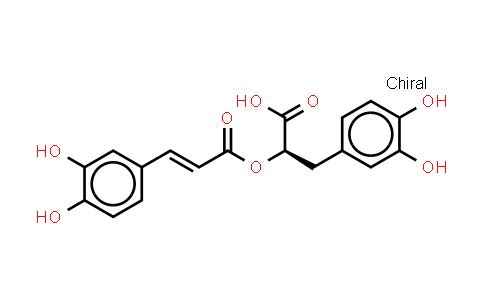
Rosmarinic acid NLT 98%
Product Number : MC538005
CAS Number : 20283-92-5
Molecular Formula : C18H16O8 | Molecular Weight : 360.31
Synonyms : Labiatenic acid
Quote Request| Purity | NLT 98% |
|---|---|
| Storage | at 20ºC 2 years |
| MolCore specializes in manufacturing high-purity CAS No.20283-92-5, Rosmarinic acid with the molecular formula C18H16O8 and molecular weight 360.31 delivering critical API intermediates for global pharmaceutical and research industries, certified under ISO quality systems. | |
* The above information is for reference only.
| Chemical Name | Rosmarinic acid |
|---|---|
| CAS Number | 20283-92-5 |
| MDL Number | MFCD00017740 |
| Molecular Formula | C18H16O8 |
| Molecular Weight | 360.31 |
| Synonyms | Labiatenic acid |
Rosmarinic acid is a widespread phenolic ester compound in the plants. Rosmarinic acid inhibits MAO-A, MAO-B and COMT enzymes with IC50s of 50.1, 184.6 and 26.7 μM, respectively. IC50 & Target: IC50: 50.1 μM (MAO-A), 184.6 μM (MAO-B), 26.7 μM (COMT)[1] In Vitro: Rosmarinic acid (RA) shows an in vitro multifunctional profile characterized by antioxidant effects, and monoamine oxidases (MAO-A and MAO-B) and catechol-O-methyl transferase (COMT) inhibition. Rosmarinic acid shows antioxidant effects against hydroxyl (HO(•)) and nitric oxide (NO) radicals (IC50 of 29.4 and 140 μM, respectively), and inhibition of lipid peroxidation (IC50 of 19.6 μM)[1]. Rosmarinic acid (RA) exerts a significant cytoprotective effect by scavenging intracellular ROS induced by UVB. In H2O2-treated cells, 2.5 μM Rosmarinic acid scavenges 60% of intracellular ROS compared to 77% of intracellular ROS scavenging effect in N-acetyl-L-cysteine (NAC)[2]. In Vivo: Rosmarinic acid (RA) is a widespread phenolic ester compound in the plants, particularly those in the Labiatae family of herbs, such as Rosmarinus officinali, Salvia miltiorrhiza, and Prunella vulgaris. Rosmarinic acid suppresses colonic inflammation in dextran sulphate sodium (DSS)-induced mice via dual inhibition of NF-κB and STAT3 activation. In the DSS-induced colitis model, Treatment with Rosmarinic acid (30, 60 mg/kg, p.o.) markedly attenuates the production of cytokines[3].
© Copyright 2015-2025 Hangzhou MolCore BioPharmatech Co.,Ltd. All rights reserved.
